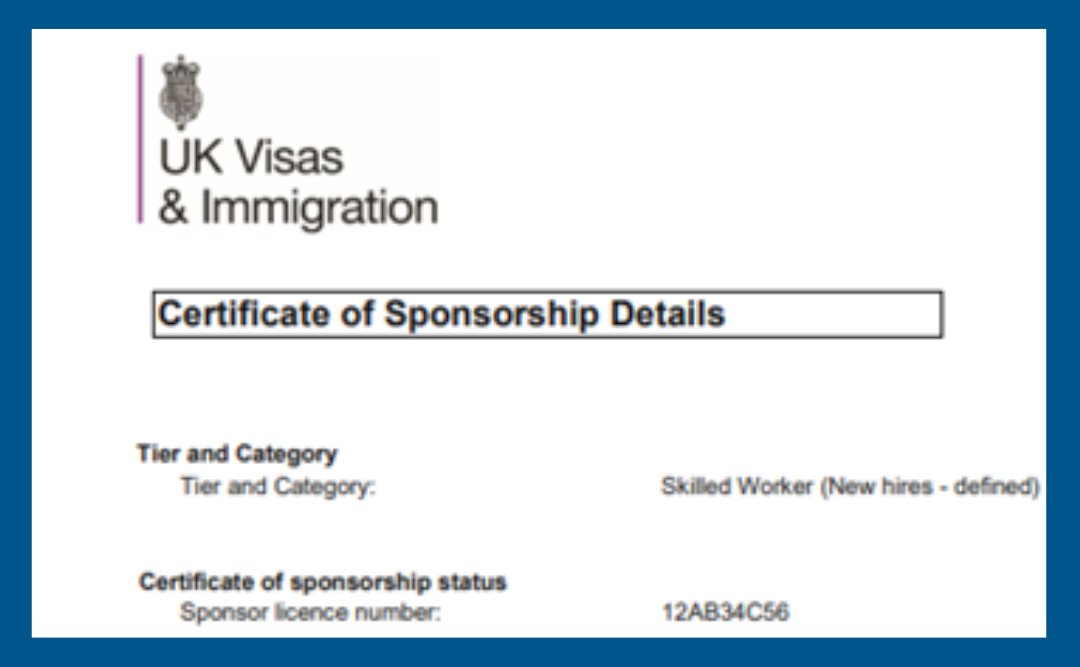Certificate of Sponsorship: A Guide For Employers


Certificate of Sponsorship: A Guide For Employers
A Certificate of Sponsorship (CoS) allocation determines the number of CoS that an employer with a Sponsorship Licence can issue to foreign workers.
CoS allocations are governed by specific regulations and limits that vary depending on the type of Sponsorship Licence and the employer's requirements.
Skilled Worker Sponsorship
Undefined CoS
Employers in the UK are allocated a specific number of Undefined Certificates of Sponsorship (CoS) each year for UK Skilled Worker visas, used for workers already in the UK (switching visas, changing employers, or extending visas). If more are needed, they can request additional allocations throughout the year by explaining the need to the Home Office, with processing times of up to 18 weeks. To speed this up, employers can use the Home Office's £200 priority service, but these slots are in high demand with only 60 daily slots and over 600 daily requests.
We offer a no-upfront fee service, charging only upon successfully securing priority slots and ensuring our clients can quickly get the CoS they need. Discover more about our standalone priority CoS allocation service and how we consistently secure these in-demand slots for our clients!
No Payment Up Front Home Office Priority Service Slot RequestDefined CoS
Defined Certificates of Sponsorship (CoS) are required to sponsor workers applying from outside the UK. Unlike Undefined CoS, Defined CoS must be applied for individually on a case-by-case basis whenever needed, and employers have no fixed annual allocation.
Unfortunately, there is no option to expedite the process for Defined CoS, so employers need to plan and request them with sufficient lead time to avoid delays in hiring overseas talent. Proper planning is crucial since Defined CoS processing times can vary.
Global Business Mobility Sponsorship
Employers holding a UK Global Business Mobility Sponsorship Licence receive an allocation of Certificates of Sponsorship (CoS) to transfer employees from international branches or subsidiaries under the new GBM routes.
These include the Senior or Specialist Worker and Graduate Trainee routes, replacing the previous Intra-Company Transfer (ICT) categories.
The number of CoS granted depends on the specific GBM route used, facilitating smoother internal mobility for global companies seeking to transfer talent between offices under this updated sponsorship framework.
Like the Skilled Worker Undefined CoS, employers are able to request an increase in their CoS allocation throughout the year.
Temporary Worker Sponsorship
Employers looking to sponsor temporary workers in sectors like hospitality, agriculture, or the creative arts will receive Certificates of Sponsorship (CoS) based on the specific Temporary Worker scheme they apply under, such as the Seasonal Worker or Creative Worker schemes.
Just like with Skilled Worker Undefined CoS, employers can request an increase in their allocated CoS if their needs change during the year.
These requests are subject to Home Office approval, and employers must justify the need for additional CoS, ensuring their allocation aligns with business demands throughout the year.
Other Sponsorship Categories
Employers holding sponsorship licences for niche categories such as Ministers of Religion, Religious Workers, or International Agreement Workers will receive Certificates of Sponsorship (CoS) allocations that vary based on the specific category.
The allocation is tailored to the unique needs of each category, ensuring that employers can sponsor workers under these specialised routes. Employers can request additional CoS throughout the year, depending on their organisation's evolving demands and workforce planning needs like other sponsorship types.
Other Sponsorship Categories
Employers must use their Certificate of Sponsorship (CoS) allocations in strict accordance with UK immigration laws. Maintaining accurate records and adhering to all sponsorship duties is crucial to ensure the continued validity of your Home Office Sponsorship Licence and ongoing access to CoS allocations.
Failure to comply can result in severe penalties, including suspension or loss of your licence, which can disrupt your business operations.
For a comprehensive overview of your obligations as a sponsor, download our Sponsor Duties Guide for free and stay compliant!
Download Free Sponsor Duties GuideOther Sponsorship Categories
A Certificate of Sponsorship (CoS) is required for all individuals applying under the Skilled Worker and Global Business Mobility visa routes, replacing the old Tier 2 categories. It is also necessary for most Temporary Worker visa applicants (previously Tier 5).
However, sponsorship is not required for applicants under the Youth Mobility Scheme, where the applicant’s country acts as the sponsor, or for those on a Global Talent Visa (formerly Tier 1 Exceptional Talent) working for your company, as this visa does not require a CoS.
Cost of a Certificate of Sponsorship (CoS)
The current cost of obtaining a Certificate of Sponsorship (CoS) depends on the visa type.
For the Skilled Worker visa, the fee is £239.
For Temporary Worker routes, such as those under the Seasonal Worker or Creative Worker schemes, the CoS costs £21.
In addition to the CoS fee, employers may also need to pay the Immigration Skills Charge when sponsoring workers under the Skilled Worker or Global Business Mobility routes. Depending on the size of the business, the charge ranges from £364 to £1,000 per year of sponsorship.
These costs are essential for employers to factor in when hiring foreign workers under the UK’s Points-Based Immigration System.
Assigning a Certificate of Sponsorship (CoS)
Assigning a Certificate of Sponsorship is essentially the process of issuing a CoS to a foreign worker, enabling them to apply for a UK visa. The process involves several important steps:
- Check Eligibility: Ensure that both your organisation and the worker meet the eligibility criteria for the relevant visa route. The worker’s job role must align with the details specified in the job description and meet the minimum salary and skill requirements for the visa.
- Create a CoS: Log into the UK Home Office's Sponsorship Management System (SMS), where you will generate the CoS. Input the worker’s personal information, details about their job role, the duration of employment, and any relevant salary information.
- Assign the CoS to the Worker: Once the CoS is generated, it needs to be officially assigned (issued) to the foreign worker. Each CoS comes with a unique reference number, which the worker will need for their visa application.
- Inform the Worker: Provide the worker with their CoS reference number and any additional details they need to complete their visa application. This reference number is crucial, as the worker cannot submit a visa application without it.
- Retain Records: Maintain a record of all CoS assignments, including details of the worker and the role. These records are essential for compliance with sponsorship duties and may be reviewed during Home Office audits or inspections.
- Monitoring and Reporting: Keep track of the worker’s visa conditions and ensure they continue to meet the requirements. Report any changes in employment (e.g., job role, salary, or early termination) or any compliance issues to the Home Office as required.
Assigning a CoS facilitates a foreign worker’s visa application and underscores the importance of maintaining compliance with Home Office regulations.